Get to the root of your hair problems with our expert trichologist.
Dedicated to helping you achieve your healthiest, most beautiful hair.
See More

Trichology is the science of the structure, function and diseases of the human hair. Clinical trichology is the diagnosis and treatment of diseases and disorders of the human hair such as: Dandruff, Hair Loss and Scalp / Hair texture problems.
Hair loss can be a distressing and frustrating experience for many individuals. It can impact your self-esteem and overall quality of life.
Understanding the underlying causes of hair loss is crucial to finding effective treatments. This is where the expertise of a trichologist comes into play.
Trichologists are specialists in hair and scalp health, and they employ various diagnostic tools, including medical history and blood tests, to uncover the root causes of hair loss.
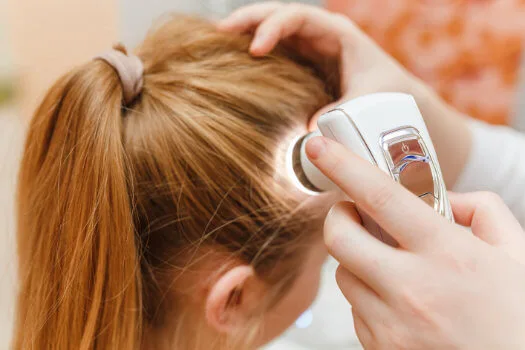

Hi, I'm Sarah, a qualified trichologist and award-winning hair professional with over 25 years of experience.
My mission is to enhance client well-being by utilising specialised knowledge, and personalised care to address hair and scalp concerns.
I am committed to providing comprehensive assessments, expert advice, and effective solutions, with the ultimate goal of promoting healthy, vibrant hair.


We have received a Prestige Award for excellence in hair and scalp health. This recognition highlights our commitment to delivering evidence-based trichology, personalised hair loss treatments, and specialist scalp care.
As an award-winning hair loss clinic in Sheffield, we support clients with conditions such as thinning hair and scalp disorders. Our clinic combines clinical expertise with a holistic, client-centred approach to achieve the best possible outcomes.
Thank you to our clients for your trust and support. We look forward to continuing to lead the way in professional trichology and scalp health.
A Trichotest is a genetic test that analyses gene variations and lifestyle factors to help personalise hair loss treatment plans. It is a simple, non-invasive test that involves a simple saliva swab.
The Trichotest is suitable for both men and women of any age who are experiencing hair loss.
It is also a good option for people who have tried other hair loss treatments without success, or who want to understand the root cause of their hair loss so that they can develop a more personalised treatment plan.

For more information call now
Call
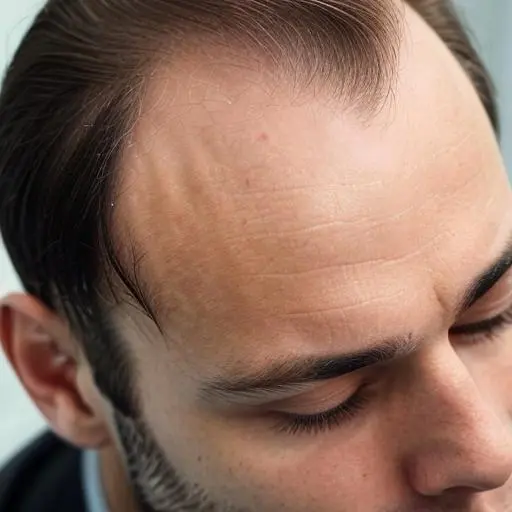
Hair loss can be very distressing and can be caused by many factors, including genetics, hormones, medical conditions, and stress. Trichologists can diagnose the underlying cause and recommend several treatment options such as medications, scalp treatments, and hair replacement systems.

Hair texture issues can be caused by genetics, environment, and hair care products. Symptoms include dryness, frizz, and brittleness. Trichologists can provide advice on how to improve hair health and manage hair texture issues, such as using gentle hair care products, avoiding heat styling tools, and deep conditioning regularly.
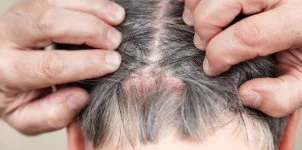
Scalp infections can be caused by bacteria, fungi, or viruses. Common types of scalp infections include folliculitis, tinea capitis, and head lice. Trichologists can diagnose scalp infections and recommend treatment options such as medications, shampoos, and scalp treatments.
Also known as the ‘Growth Phase’ or ‘Active Phase’, the Anagen Phase is when the cells in the root of your hair are most rapidly dividing so more new hair is formed.
During the Anagen Phase, your hair grows around half an inch a month [about 6 inches a year], and faster in the summer than in winter.
This phase of the Hair Growth Cycle lasts an average of 3-5 years — so a full-length hair growth averaging 18 to 30 inches. The Anagen Phase is generally longer in people of Asian descent, and can last as much as 7 years — meaning your hair may be able to grow up to 3 feet long!
Following the Anagen Phase, your hair cycle enters a short transitional phase known as the Catagen Phase, which signals the end of active hair growth and cuts individual hairs off from the blood supply and from the cells that produce new hair. Approximately 3% of all hairs are in this stage at any time.
Approximately 10 days.
The third stage of your natural hair growth cycle is the Telogen Phase, a resting period when strands remain in their follicles but are not actively growing. An estimate of 10-15% of your hairs are in the Telogen Phase at any given moment.
Approximately 3 months or 100 days
The final stage of the Hair Growth Cycle, when individual hair strands are released from their follicles and fall out. Now the whole process can begin again! What Happens when the Hair Growth Cycle is Disrupted? Each hair follicle is independent and goes through the growth cycle at different times — otherwise all your hair would fall out at once! Instead, you only shed a certain number of hairs a day – 80 to 100 hairs on a healthy head of hair.
Hair loss, hair thinning and problems with hair growth may occur when your growth cycle is disrupted. This can be triggered by conditions such as metabolic imbalances, illness or improper nutrition.
For instance, around 12 weeks after restrictive dieting or a high fever, you may experience telogen effluvium (sudden diffuse hair fall). This occurs when your anagen (growth) phase is cut short, and many hairs enter the telogen (resting) phase at the same time – resulting in increased hair fall 3 months later during the exogen (shedding) phase.
If your hair growth cycle is constantly disrupted for example, not supported with good nutrition, you may find that your hair will not grow as long as it used to. This is because your hairs are never allowed to stay in the anagen phase long enough to reach the desired length.
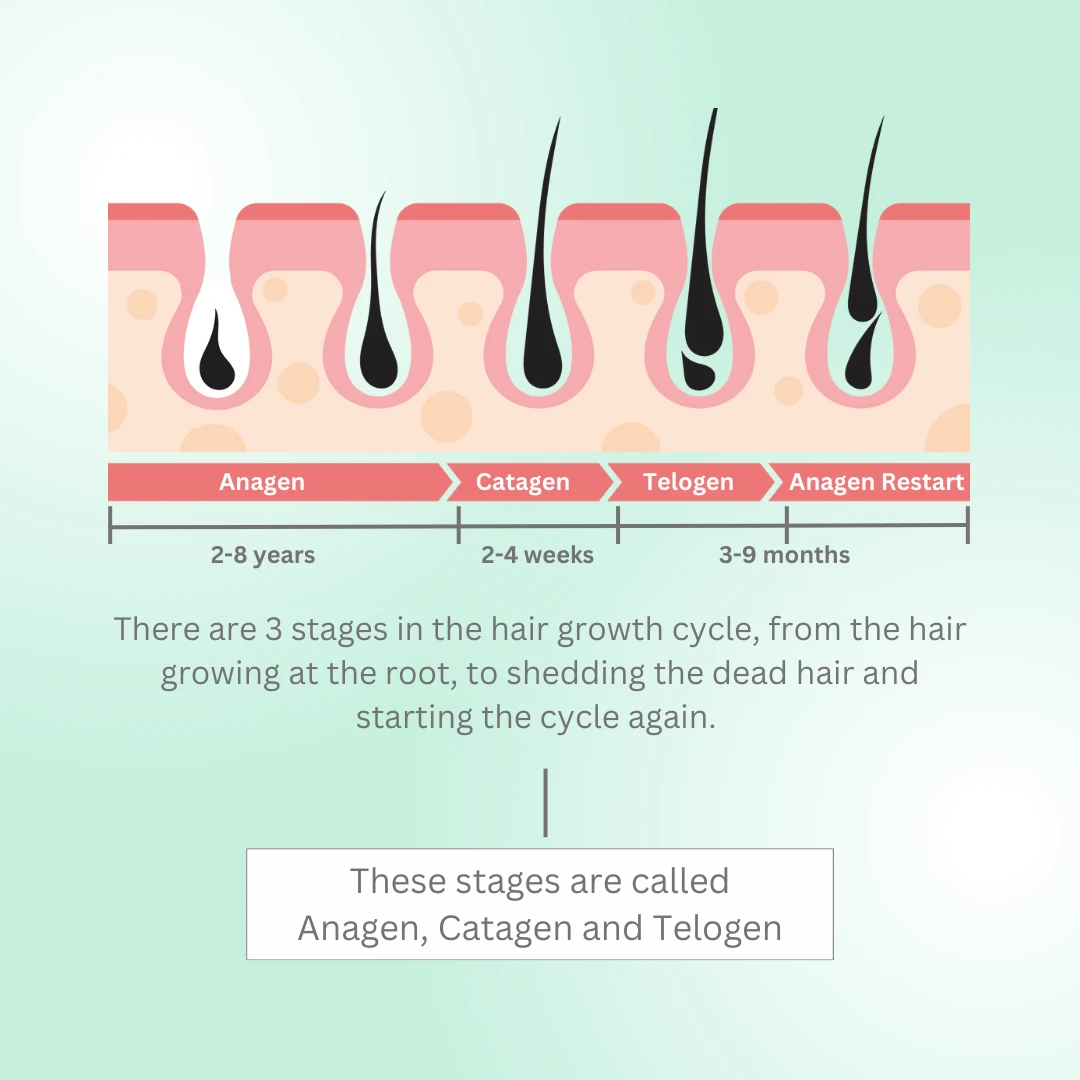
Trichology consultation - face to face with trichoscopy and full report.
45 Mins
£130
Trichology consultation and full report. (Remote via Zoom)
45 Mins
£120
Trichtest (DNA test including trichology consultation and full report)
1 Hour
£360
Follow-up trichology consultation within 12 months.
30 Mins
£60
Theradome laser phototherapy (1 session)
30 Mins
£20

A thorough medical history is the first step in the diagnostic process. The trichologist will engage in a detailed conversation with the patient to gather crucial information. This conversation may include questions about:





In addition to the medical history, blood tests play a pivotal role in diagnosing the underlying causes of hair loss. These tests can reveal several key factors, including:



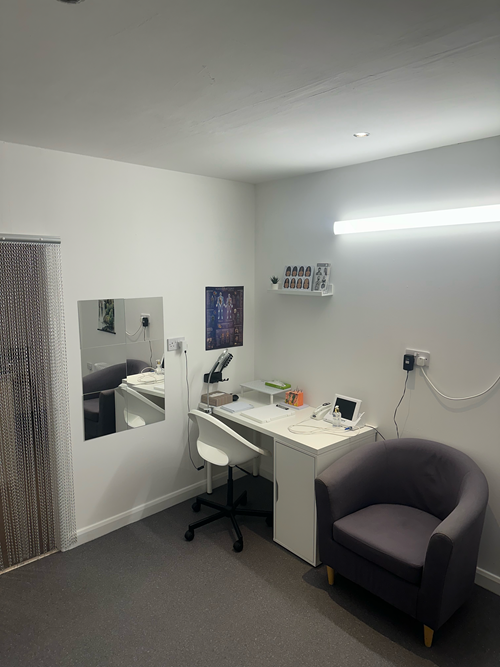
Our Trichologist interprets these test results in the context of the clients medical history to pinpoint the specific cause of hair loss. This targeted approach allows for a more precise and effective treatment plan.
It's important to note that each case of hair loss is unique, and the diagnosis can vary from one individual to another. This is why a personalised approach, involving both medical history and blood tests, is critical to understanding the underlying causes and creating a tailored treatment plan.
Our trichologist is dedicated to unravelling the root cause of hair your hair loss by carefully examining your medical history and utilising blood tests to diagnose the underlying causes.
With this comprehensive approach, clients can receive the appropriate guidance and individual treatment plan to restore their hair and confidence. Each client is unique, and treatment plans vary for each individual. A full detailed report will be provided within 7 days of the examination and a referral to another specialist may be required.


For more information call now
Call